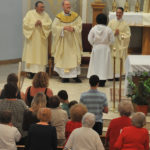Rusty Boruff served time for burglary, turned to God to redeem his life and now leads One Eighty, an organization he founded 10 years ago in Davenport to help people like himself rebuild their lives. About 75 adults live in One Eighty residential units as they work their way through a 14-month program that includes employment and accountability. The majority of these adults have been convicted of felonies. Their ability to claim ownership in their communities requires another key ingredient — the restoration of their right to vote upon completion of their sentences for felony convictions.
Iowa remains the only state in our nation that by law denies the right to vote to any individual with a felony conviction. Those individuals may petition the governor to restore their voting rights, but the requirements — including payment of court costs, fees and restitution — may discourage many of them from applying. We expect them to be contributing members of society while withholding a right we hold precious in our democracy. As citizens, how is that justice? As faithful Catholics, how is that mercy?
Davenport boxer “Stunning” Stephen Edwards, a Catholic, wonders why he can’t vote even though he paid his debt to society, is gainfully employed, pays taxes and operates a boxing club to help others avoid making the poor choices he initially made.
The Iowa Legislature, at Governor Kim Reynolds’ urging, has begun the process to pursue an amendment to the state constitution granting voting rights to individuals convicted of a felony who have completed their sentences. Thank God that she believes in second chances and the opportunity for redemption. During a Feb. 28 event in Davenport, she shared a story about a talk she gave to women at the Iowa Department of Corrections Institution at Mitchellville. She told the women she was a recovering alcoholic who realized the need to “turn it over to God and ask for help” (Quad-City Times, Feb. 29, 2020). Her story speaks volumes about mercy and redemption.
House Joint Resolution HJR 14, which would enable people who have committed felonies to vote once they have completed their sentence, passed last year. However, a bill to define “completion of sentence” (SF 2348) recently passed the Senate Judiciary Committee. It would require payment of all restitution to victims before ex-offenders receive restoration of voting rights. The financial requirement means that the wealthiest ex-offenders will have their right to vote restored long before those with little wealth.
Boruff had his voting rights restored after serving his sentence in Illinois for burglary committed in Illinois. It took him nearly eight years to pay off $10,000 in fines because low-paying jobs were the only kind he could find as someone convicted of a felony. Employment, housing and other issues that challenge convicted felons returning to the community warrant a future editorial.
Joan Thompson, associate for research and outreach at the Iowa Catholic Conference (ICC) explains in a compassionate statement (March 26, 2019) why we should support restoration of voting rights for those who have committed a felony. In part:
“As Catholics, we don’t abandon those that commit crimes, and consider it our obligation to assist those who undertake the process of addressing the damage they have inflicted and are working to repay their debt to the community. The common good can’t be served by rejecting them in their effort to rejoin society as contributing, law-abiding members. We are called to support, not obstruct, that reintegration and restoration, for the benefit of all.”
“Civic participation is a moral obligation of our faith teaching, and exercising the right and responsibility of participating as voters is a key component. Restoring the right to those convicted of a felony who have satisfied their debt is a measure of mercy, but also dignity and justice.”
Boruff’s One Eighty has started eight successful enterprises within its organization and approximately 95 individuals have graduated from its programs, with more each year. Many are convicted felons committed to living productive lives in their communities.
Edwards said restoration of his voting rights would make him feel “more like a U.S. citizen than a felon.” People will “recognize how I’ve changed my life.”
Ask your Iowa state senator to support House Joint Resolution 14. You can compose a message on the ICC website (votervoice.net/ICC/Campaigns/71647/Respond).
Restoration of voting rights is a measure of mercy, dignity and justice.
Barb Arland-Fye, Editor
(arland-fye@davenportdiocese.org)











